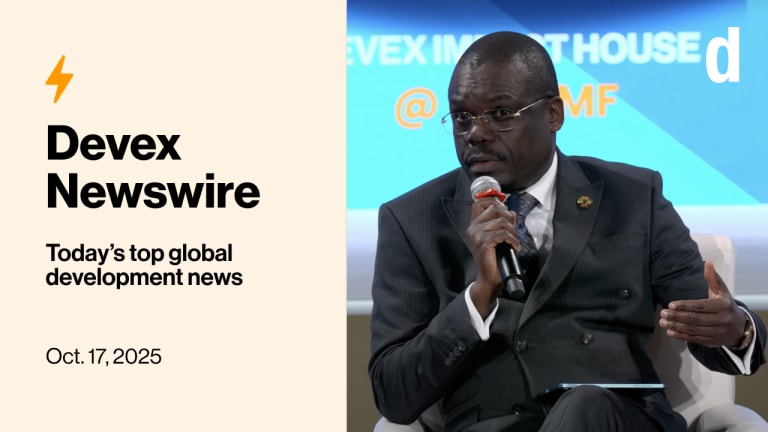
BOBO-DIOULASSO, Burkina Faso — When weeks pass and Hermann Ky doesn’t see some of the regular street children in Burkina Faso’s western town of Bobo-Dioulasso, he fears the worst.
Often lured away by armed groups with promises of money and a better life, the children aren’t directly told they’ll be forced to fight, rather that they’ll have jobs in mining sites in neighboring countries only to be exploited, said Ky, who works with Association Tie, a local organization trying to prevent children from being recruited by the country’s soaring jihadi insurgency.
“What we want them to understand is that it’s not by sacrificing themselves that they’ll go to heaven. It’s not possible,” he said. “We tell the children that it’s not too late for you to change … you can become good citizens … even presidents.”
As violence linked to al-Qaida and the Islamic State in the West African nation spikes, killing thousands and internally displacing more than 1.4 million people, children are being increasingly recruited by jihadi groups. The number of children recruited by armed groups in the country rose five-fold this year compared to last — up from four documented cases — according to an internal report by international aid groups and conflict experts seen by Devex.
For the first time this year, the United Nations annual report on children and armed conflict included Burkina Faso, signifying the concerning impact the conflict is having on children. In the hard-hit north and Sahel regions, aid workers said they see children more frequently manning roadside checkpoints alongside jihadis. In the country’s deadliest attack since 2015 on Solhan town in June, where at least 160 people were killed, children were seen burning buildings and chanting “Allahu akbar,” or “God is great” in Arabic, according to survivors.
To try and combat the problem, a handful of aid groups are working with children, teachers, religious leaders, and families on conflict mitigation, the importance of social cohesion, and what to do if approached by recruiters. However, they said those efforts scratch the surface and that prevention messaging needs to be combined with development in order to address the root causes — poverty, injustice, and unemployment — that are driving children into joining these groups.
Development as a deterrent
“[Development and prevention] need to go together,” said Calixte Bakone, project coordinator for Progettomondo, an Italian-based aid group focused on preventing child recruitment by armed groups in Bobo-Dioulasso and other parts of Houet province.
“After the emergency, the problem will come back again because you have not treated the problem, you’re treating the symptoms,” Bakone said.
Since 2019, the organization has been working with 15 schools, reaching some 1,200 children as well as training imams, teachers, journalists, and community leaders in Bobo-Dioulasso and other parts of the province about tolerance and prevention. While there have been some gains, such as children being less violent with each other, and teachers and parents feeling better equipped to communicate and deal with conflict, community members said it doesn’t deal with the driving factors, which need to be addressed through building schools and providing vocational training and job opportunities.
Many rural villages don’t have schools, and in towns that do have schools, often there are 150 children per teacher and when students graduate there are no jobs with the government or the private sector, locals and aid groups said.
“The current security crisis in Burkina [Faso] cannot be won by military means alone. It is crucial to address longstanding root causes of the conflict, absolute poverty, inequality, lack of opportunities, and sense of injustice.”
— Steen Sonne Andersen, Denmark’s ambassador to Burkina Faso and Niger“Something needs to be done to occupy the youth so that they may not join the groups. If you ask someone not to do this or that, then you need to give them something else,” said Youssouf Barro, an imam in Bobo-Dioulasso who speaks with children about the dangers of joining jihadi groups.
When ‘you don’t have anything to lose’
There are many reasons why children join armed groups, including forced abduction, promises of money, or being given to groups by families in exchange for protection, conflict experts said. Street children are particularly vulnerable to recruitment as they’re on their own, not with their families, and have basic needs to fill, said Theophile Sawadogo, who also works with Association Tie.
Since the conflict, there’s been an increase in street children in Bobo-Dioulasso, according to aid workers. The number of newly registered children went from 115 last year to 368 this year, according to NouSol, a Spanish aid group that works with street children in the city. Violence has pushed families deeper into poverty, forcing children onto the streets because parents can’t care for them, it’s also shuttered nearly 3,000 schools — approximately 11% of the country’s schools — impacting some 334,000 children according to UNICEF, which means children have nothing to do.
Some of the largest number of street children are the talibes — boys sent from home to learn the Quran — who escaped from schools where they’re sometimes beaten by imams for not making enough money from begging — a practice the schools force them into — according to locals, aid groups, and children.
Fifteen-year-old Moussa Sawadogo spent three years at a Quranic school and was beaten regularly by his imam if he didn’t bring home enough money — $0.85 during regular days and $1.70 on Fridays, a holy day, he said.
“I went to learn the Koran but I was beaten,” Sawadogo, whose name has been changed to protect his identity, said. After three years he fled to the streets and has been there since.
Some of the Quranic schools are said to be drivers of radicalization. Results from surveys with religious and community leaders, teachers, parents, and local officials conducted last November by the Women’s Collective for Solidarity, a local women’s group, said that messages conveyed in some Quranic schools “disturb the children and lead them to radical behavior.” The words of the Quranic teachers are literally applied by the students and everything is only analyzed from a religious perspective with no acceptance of another person’s culture and religion, the survey found.
But Mahmoud Bayoulou, an imam at a traditional Quranic school, said his children don’t join jihadis because he instills in them “the fear of God.” He blames the government for favoring children from modern schools over those from traditional Quranic schools, who he said have fewer opportunities.
However, during a visit to Bobo-Dioulasso in November, Devex spoke with students who said that regardless of what kind of school they go to, there are few opportunities once they graduate: with a high demand for government jobs and few positions available, minimal access to private sector jobs, and without the skills to become entrepreneurs.
“If jihadists come and say to you that after an attack they’ll give you $85,000 since you know that you don’t have anything to lose, you’ll join them. They’re going to brainwash you and you’ll become a [jihadi]. That means that the state has to take a look at this problem of youth employment,” Mohamed Aziz Dao, a 24-year-old student, said. “The government should consider recruiting more young people, creating more jobs, and funding young entrepreneurs,” he said.
Addressing longstanding root causes
The government says it’s aware of the problem and is trying to create more employment for the youth by adapting the curriculum in schools to include practical courses such as solar installation and audiovisual learning, as well as developing leadership and entrepreneurial programs, said Alladary Coulibaly, provincial director for secondary and post-secondary education for Houet province.
Aid groups that were already working with at-risk children have started adapting programs due to the growing threat of recruitment. Last year, NouSol pivoted its program that helps reunite street children with their families after noticing that the children would return to the streets shortly after going home because their parents couldn’t care for them. In October 2020, NouSol started giving families a $340 loan to help their existing businesses or allow them to launch new ones when it would return their children, Joel López Beltrán, the organization’s founder, said.
“The lifestyle in the streets, drugs, sex, stealing is very close to [the] jihadist style … It’s [a] similar life, it’s not a good life. For that it’s important they have opportunities and … they think they can change,” he said.
The key to keeping children off the streets is to involve and invest in the family and the community. Since the program began, nine families have been given micro credits and none of their children have returned to the streets, he said.
Some donors are also supporting projects combining development with prevention. The Danish embassy funds several programs, including one in the country’s east that raises awareness about peace through dialogue, while simultaneously creating gardens for 45 women in order to give them a source of income and combat the lack of employment.
In the Sahel region, it brought together 600 religious and community leaders to speak about preventing radical and extremist discourse while also providing 15 Quranic students with vocational training.
“The current security crisis in Burkina [Faso] cannot be won by military means alone. It is crucial to address longstanding root causes of the conflict, absolute poverty, inequality, lack of opportunities, and sense of injustice,” Steen Sonne Andersen, Denmark’s ambassador to Burkina Faso and Niger, told Devex.
“These are root developmental problems that must be addressed to prevent further escalation of violent conflict. Large scale investment in development, targeting drivers of conflict i.e., preventing further conflict must accompany security solutions,” he said.








